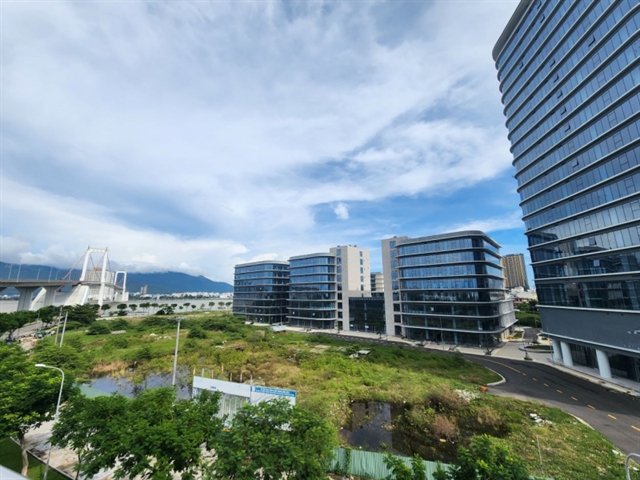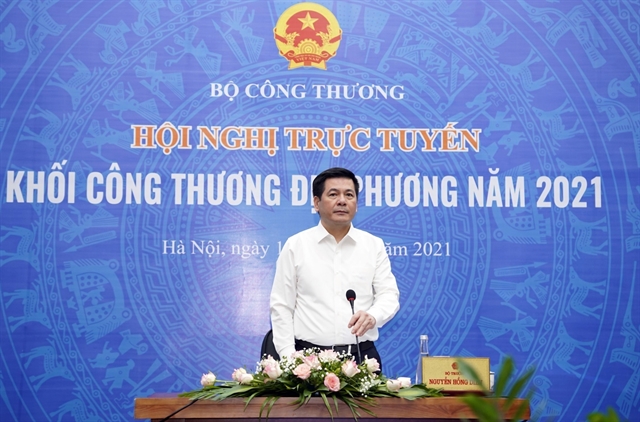 Talking Shop
Talking Shop


|
| Minister of Industry and Trade Nguyễn Hồng Diên. |
Enterprises, as the driving force for economic development, need to be more proactive in developing business and production plans in the context of the COVID-19 pandemic, especially taking more advantage of free trade agreements (FTAs) to increase exports.
Minister of Industry and Trade Nguyễn Hồng Diên speaks to Vietnam News Agency about this issue.
Free trade agreements (FTAs) have contributed a great part to the growth of national exports this year. How has Việt Nam taken advantage of FTAs to boost its export turnover?
The FTAs that Việt Nam has signed have been opening the door for Việt Nam to integrate further into the global value chain and production network.
New-generation FTAs, such as the Comprehensive and Progressive Agreement for Trans-Pacific Partnership (CPTPP), the EU-Việt Nam Free Trade Agreement (EVFTA) and the Việt Nam-UK Free Trade Agreement (UKVFTA), are being implemented comprehensively and effectively. Therefore, export turnover to these markets has achieved high growth despite the pandemic.
Especially, the EVFTA, which came into effect on August 1, 2020 has created a huge boost for Việt Nam's exports, helping to diversify export markets and products.
Besides achieving higher bilateral trade value, investment attraction activities between Việt Nam - EU have also had positive results.
Next year is considered important because the Regional Comprehensive Economic Partnership (RCEP) comes into force. What does the local business community need to do to take advantage of this agreement?
The RCEP was signed by 10 ASEAN member nations and five ASEAN partners, namely China, Japan, South Korea, Australia and New Zealand on November 15, 2020 on the sidelines of the 37th ASEAN Summit organised by the Association of Southeast Asian Nations (ASEAN) with Việt Nam as ASEAN Chair.
From January 1, 2022, this agreement will connect the four FTAs that ASEAN has signed with its previous partners, forming a new free trade region with one rule of origin and regulations on facilitating trade and investment activities.
This will develop regional supply chains and open up a stable and long-term export market for Việt Nam. It also creates opportunities to attract foreign investment for Việt Nam, contributing to economic recovery after the COVID-19 pandemic.
However, to take advantage of those FTAs, local businesses and associations need to actively seek information and carefully study the agreements. That will help them grasp the commitments of Việt Nam and partners in the fields of production and business, proceeding to participate further in the regional supply chain.
The enterprises also need to innovate and improve competitiveness, meeting requirements in the process of international economic integration and developing production and business.
To support Vietnamese businesses in taking advantage of the FTAs, the ministry is developing a plan to implement the RCEP.
At the same time, the ministry also promotes the dissemination of information about FTA commitments to relevant agencies, organisations and domestic enterprises, especially small and medium enterprises.
What specific policies will the Ministry of Industry and Trade (MoIT) implement to help domestic businesses recover in production and exports in 2022, contributing to the country's economic growth?
The ministry will continue to implement the Government's Resolution 128/NQ-CP on temporary regulations for safe, flexible adaptation to and effective control of COVID-19 and guidance from the Ministry of Health and the Ministry of Transport to ensure circulation of goods and labour force for restoring production activities after the pandemic.
Along with that, the ministry will ensure a supply of raw materials and energy to meet the requirements of production and business recovery and socio-economic development.
The ministry will remove difficulties and obstacles for important industrial projects, and support factories in maintaining and restoring production.
MoIT will accelerate the development of large public investment projects, especially projects on energy and infrastructure for industrial development, to promote business activities of the economy and market development for a number of key industries.
Especially, the ministry will also monitor the developments of COVID-19 and trading of goods between countries to propose to the Government solutions for adverse factors.
Moreover, MoIT will support domestic businesses to take all opportunities and limit challenges from FTAs, especially new-generation FTAs.
With the new situation, the ministry continues to organise trade promotion programmes and programmes connecting supply and demand both at home and abroad on new online platforms.
The ministry will coordinate with other ministries and sectors to promote the development of logistics services and reduce the costs of using transport infrastructure to improve the competitiveness of Vietnamese goods.
It will also focus on implementing administrative procedures in trade activities under the National Single Window and ASEAN Single Window.
The ministry will implement the Strategy for Domestic Trade Development for the period to 2030, with a vision to 2045, and closely monitor the market to promptly respond to unusual fluctuations, especially in agricultural products and essential goods.
It will also promote inspection, control and handling of administrative violations for smuggled goods, counterfeit goods, goods infringing intellectual property rights, and goods that do not ensure food safety, and especially violations in the fields of e-commerce and origin of goods. VNS




